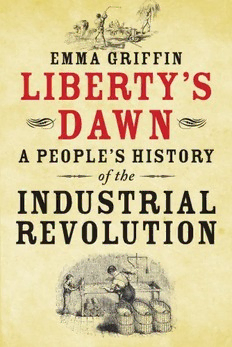
A people's history of the Industrial Revolution PDF
Preview A people's history of the Industrial Revolution
LIBERTY’S DAWN 4017.indd 1 25/01/13 8:21 PM 4017.indd 2 25/01/13 8:21 PM EMMA GRIFFIN LIBERTY’S DAWN A q q A PEOPLE’S HISTORY of the INDUSTRIAL REVOLUTION YALE UNIVERSITY PRESS NEW HAVEN AND LONDON 4017.indd 3 25/01/13 8:21 PM Copyright © 2013 Emma Griffin All rights reserved. This book may not be reproduced in whole or in part, in any form (beyond that copying permitted by Sections 107 and 108 of the U.S. Copyright Law and except by reviewers for the public press) without written permission from the publishers. For information about this and other Yale University Press publications, please contact: U.S. Office: [email protected] www.yalebooks.com Europe Office: [email protected] www.yalebooks.co.uk Set in Adobe Caslon Pro by IDSUK (DataConnection) Ltd Printed in Great Britain by TJ International Ltd, Padstow, Cornwall Library of Congress Cataloging- in- Publication Data Griffin, Emma. Liberty’s dawn: a people’s history of the Industrial Revolution/Emma Griffin. pages cm ISBN978-0-300-15180-0 (hardback) 1. Industrial revolution—Great Britain. 2. Great Britain—Social conditions. 3. Great Britain—Economic conditions. I. Title. HC253.G75 2013 330.941’07—dc23 2012050618 A catalogue record for this book is available from the British Library. 10 9 8 7 6 5 4 3 2 1 4017.indd 4 25/01/13 8:21 PM For David, Benedict and Anna 4017.indd 5 25/01/13 8:21 PM An ample theme: the intense interests, passions, and strategy that throb through the commonest lives. —Thomas Hardy, The Life and Work of Thomas Hardy, ed. Michael Millgate (London, 1884), p. 158 The most remarkable century ever known in the history of the World, for progress in Education, inventions, Engineering, Electricity, Farming, everything tending to the betterment of the Nation and the Welfare of the People and making life worth living. —Richard Cook, p. 26, Lincoln Reference Library 4017.indd 6 25/01/13 8:21 PM q Contents Acknowledgements ix 1 Introduction: ‘A Simple Naritive’ 1 PART I Earning a living 21 2 Men at Work 23 3 Suffer Little Children 57 4 Women, Work and the Cares of Home 84 PART II Love 107 5 A Brand New Wife and an Empty Pocket 109 6 Naughty Tricks on the Bed 134 PART III Culture 163 7 Education 165 8 Gospel Times 186 9 Sons of Freedom 212 10 Conclusion 241 Notes 248 Bibliography 281 Index 296 4017.indd 7 25/01/13 8:21 PM 4017.indd 8 25/01/13 8:21 PM q Acknowledgements any friends and colleagues have been kind enough to offer advice M and criticism on this project at various stages. I would like to thank Silvia Evangelisti, Tim Hitchcock, Jane Humphries, Gareth Stedman Jones and Leigh Shaw- Taylor for discussing this project. I am particularly grateful to Gregory Claeys, David Craig, Christopher Ferguson, John Hatcher, Richard Huzzey, Jo Innes, Steve King, Peter Mandler, Sarah Pearsall, Heather Savigny, Anne Secord, Patrick Wallis and Andy Wood for reading and commenting on work in progress. Carolyn Steedman let me read her work on Joseph Woolley and that and the communications that followed have been of immense value. Robert Poole has helped me out with queries about Samuel Bamford, and Christopher Ferguson has set me straight on points of detail concerning James Carter. I am grateful to all for countless corrections and for helping me to improve my argument and expression in significant ways. I have had the opportunity to present ideas to seminar audiences at the Cambridge Group for Population History; the Local Population Studies Society; Robinson College, Cambridge; Southampton University; Gonville and Caius College, Cambridge; the Institute of Historical Research, London; All Souls College, Oxford; and St Anne’s College, Oxford. I must thank the organisers of these events for their invitations and the audiences for invaluable criticism, advice and encouragement. What follows is certainly the better for its engagement with so many critical listeners. The actual completion of this book was made possible only by a research fellowship from the Arts and Humanity Research Council and a year’s study leave from the University of East Anglia. My thanks are due to both institutions for these much valued periods of research leave. 4017.indd 9 25/01/13 8:21 PM
